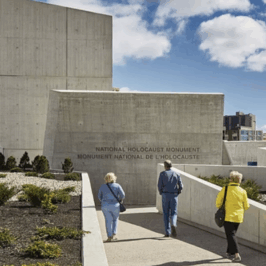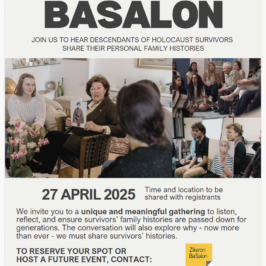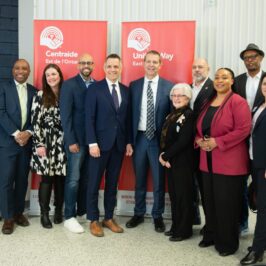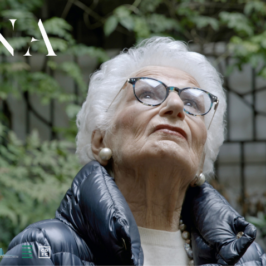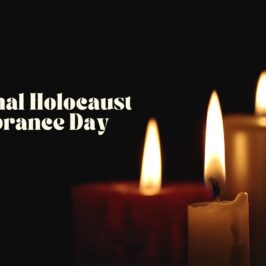by Andrew Duffy
November 3, 2021
This article was published in The Ottawa Citizen

The acclaimed actor, writer and director grew up in this city, and, at the age of seven, joined the Ottawa Little Theatre, where he plunged into the deep waters of acting.
“I found myself under water and I could breathe there,” he says of the stage. “The truth is I never left: It’s 66 years later and I have never left.”
Rubinek, now 73, will be the keynote speaker next week in a virtual event organized by the Centre for Holocaust Education and Scholarship. As part of the virtual event, Rubinek will perform selections from his latest play, All in the Telling.
The play tells a multigenerational story rooted in the wartime experience of his late parents, Israel and Frania Rubinek, who fell in love before the war, married in occupied Poland and survived the genocide of European Jews thanks to a series of daring and miraculous escapes. A Polish farm family, the Banyas, hid them for two and a half years during the darkest hours of the Holocaust.
Saul Rubinek grew up immersed in his parents’ stories of life and death, love and horror. It wasn’t until he was about eight years old and sleeping at a friend’s home in Ottawa that he came to understand not all parents screamed and cried during the night.
“Until then,” he says, “I thought that, in every house, the kid’s job was to go into your parents’ bedroom when they’re having nightmares to make them OK.”
Rubinek has previously explored his family’s epic history in a 1987 book and documentary film, which shared the title So Many Miracles . As Rubinek explains it, the book “began as a kind of subterfuge,” an attempt to restore his relationship with his father, who refused to speak to him after he began to live with a non-Jewish girlfriend. He told his parents he wanted to interview them so he could write a book about their experiences in Poland: Rubinek knew his father wouldn’t be able to remain silent once he heard his mother telling their stories.
The interviews played out over 10 years, and Rubinek travelled with his parents back to his mother’s hometown, Pinczow, Poland. It was the place where Israel, an aspiring actor, and Frania first danced together and fell in love. The farm where they hid from the murderous Nazis for 28 months was just outside town, and the Rubineks reunited with surviving members of the Banya family.
That experience, Rubinek wrote in So Many Miracles, allowed him to better cope with his parents’ Holocaust memories, which formed “part of my imagination as surely as it was part of their history.”
Rubinek’s new play, All in the Telling, encompasses a third generation of his family: his daughter, Hannah. Rubinek and his wife, Elinor Reid, decided to protect Hannah from the horrors of the Holocaust when she was young and carefree. It was, in part, a reaction to his own haunted childhood.
“I knew about the Holocaust and my background before I remember anything else,” Rubinek says.
It wasn’t until she was 13 that Hannah was allowed to read her father’s book and watch the film, So Many Miracles. Later, when she graduated from college, she announced to her father that she intended to re-edit his book and add those parts — including one terrible truth — that he had omitted.
“My daughter convinced me that to tell the whole truth — without omission and any whitewashing of the facts to save people’s feelings — was an important thing in my life,” Rubinek explains.
All in the Telling unfolds that story while examining Rubinek’s complicated and loving relationship with his parents. “It’s a comedy as much as it is dark,” he says, “and I hope it will ring true to everyone who has parents.”
Rubinek wants to premiere a full production of the play in Ottawa. “It would be a dream of mine,” he says. “Ottawa is where I grew up in the theatre. Ottawa is where I found water. Ottawa is where I learned to breathe underwater.”
Rubinek was born in July 1948 near Munich, Germany, in a displaced persons camp, Föhrenwald, where his father helped run a Yiddish theatre company. The family was sponsored to immigrate to Canada by relatives in Montreal and arrived before Saul’s first birthday. They moved to Ottawa in the mid-1950s.
Rubinek spoke Yiddish, some street French and a smattering of English when he began at Osgoode Street Public School. He was still learning English when a Sandy Hill neighbour and amateur actor named Bobby Dermer told him about the Ottawa Little Theatre.
“He was a funny, wonderful kid: He was a hero to me,” Rubinek says.
The theatre school was free for boys since so few attended, and Rubinek flourished under the tutelage of drama teachers such as Barbara Meiklejohn and Faith Ward. “They were creative forces, and they influenced and inspired many, many children, including me,” he says.
He joined the company at the Stratford Festival in 1969 and ever since has appeared regularly on stage and screen. Widely recognized today as one of Hollywood’s foremost character actors, he has appeared in films such as Wall Street, The Bonfire of the Vanities, True Romance and Unforgiven, and he has had recurring TV roles in Warehouse 13, The Last Tycoon and Frasier. He’s currently working alongside Al Pacino in Hunters, a series streaming on Amazon Prime.
Rubinek’s keynote address, organized by the Centre for Holocaust Education and Scholarship, is being held to commemorate the 83rd anniversary of Kristallnacht, a two-day pogrom launched on the evening of Nov. 9, 1938.
During Kristallnacht, thousands of Jewish synagogues, businesses and homes were smashed and plundered in a wave of violence approved by Nazi party officials. At least 91 people were killed and 267 synagogues destroyed, many of them burned in full view of firefighters, while more than 30,000 Jewish men were rounded up by the Gestapo and Schutzstaffel (SS) and sent to concentration camps.
When “The Night of Broke Glass” was over, Nazi officials blamed Jews for the violence, imposed a massive “atonement tax” on them and confiscated their insurance payouts to protect German insurance companies against losses.
People interested in attending the virtual event on Nov. 9 at 7 p.m. can register online at the Centre for Holocaust Education and Scholarship.

